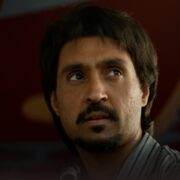Staff Inquiry: Favorite Musicals
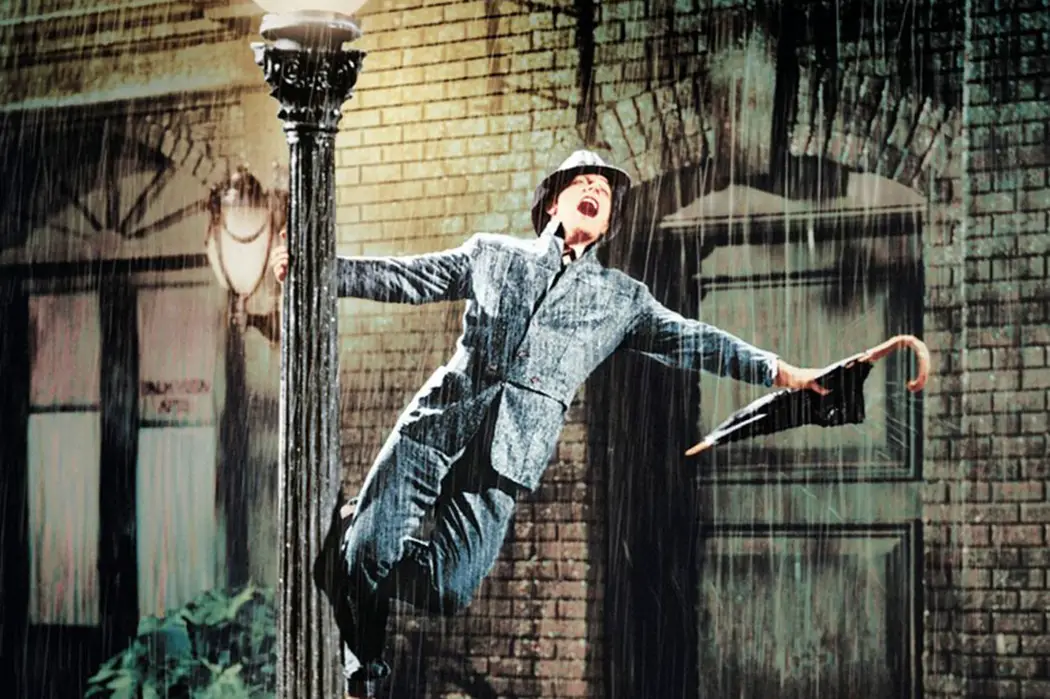
Alex is a film addict, TV aficionado, and book lover.…
Warm up your pipes and put on your dancing shoes, because this month’s staff inquiry covers our favorite musicals! We’ve got Astaire, Fosse, the golden age, and the modern age in this far-reaching survey of the beloved genre.
Sadly, the musical has gone out of style in the West, with sporadic hits like Chicago and The Greatest Showman failing to bring them back in full force. It’s a strange phenomenon because toe-tappers can be endlessly crowd-pleasing and engrossingly cinematic, but Hollywood still seems hesitant to invest much money in the genre. From the enthusiasm of our staff, I’m guessing many of them would stump for a full-on resurgence, and you may too after reminiscing with us about some of the greats.
Tynan Yanaga – The Band Wagon (1953)
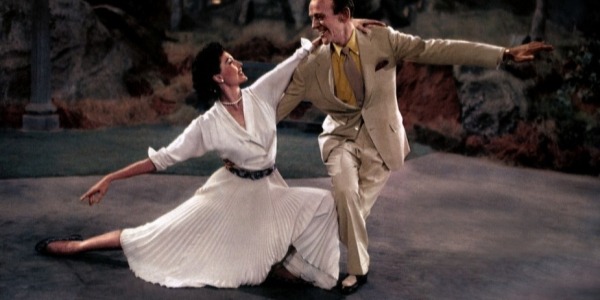
I enjoy these topics because they allow my mind to wander, to be overtaken by fits of daydreams and to ultimately arrive at decisions not through rationality but by the whims of my heart. One could wager that my writing is not persuasive enough nor nearly eloquent enough to convince you regardless. So be it.
It’s fitting that musicals would conjure up flights of fancy, as that’s what the best in the genre are: fantasies. Two of my favorites are Singin’ in The Rain (1952) and Young Girls of Rochefort (1967); both, not coincidentally, feature Gene Kelly.
But being a purist, it would be folly to acknowledge the Technicolor confections of old without mentioning the man that Kelly was forever chasing, maybe the greatest musical performer that ever lived. Yes, I’m speaking of Fred Astaire, and his The Band Wagon (1953) is one of my other personal favorites.
Dismissive folks who have seen its predecessor might indubitably label it ‘Singin’ in the Rain on Broadway.’ That’s marginally true; it had the same script team in Adolph Green and Betty Comden, and it’s still MGM with Arthur Freed overseeing his famed unit.
But all those cursory observations take for granted the talent on display, because Astaire and Cyd Charisse are arguably the greatest pairing of pure dancers there ever was. Vincente Minnelli rivaled if not surpassed Stanley Donen in his luscious mise-en-scène. Meanwhile, Astaire jaunts through one of his most organically entertaining numbers “Shine Your Shoes” only to be eclipsed by the rapturously romantic “Dancing in The Dark.”
With one final number that mashes up film noir with stylized choreography, you couldn’t get a better finale. Oscar Levant and Nanette Fabray, ever lithe and witty, provide the comic relief. It positively exclaims to anyone who sees it: That’s Entertainment! And it most certainly is.
Benjamin Wang – Hellzapoppin’ (1941)
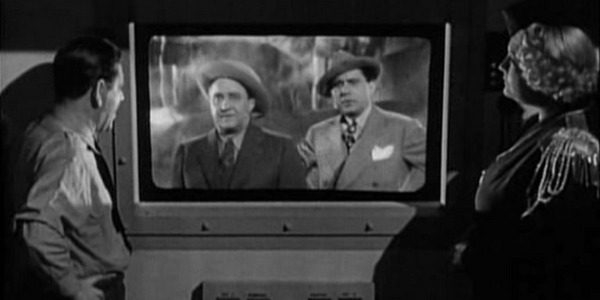
Hellzapoppin’ is about a pair of filmmakers who enter their own movie while it’s still in production. The frame world they live in bleeds over into the world of their film and vice-versa. To make matters even sillier, the frame world is no more realistic than the film world: both are realms of slapstick comedy, visual puns, and trick photography.
The musical numbers are most impressive for how they’re staged. One features the movement on screen pausing and rewinding, as if the film itself were dancing. Another is a slapstick routine in which a character sings and dances at another character, causing him all kinds of misfortune. The best, however, is certainly the one which features a truly spectacular dance number on par with even the most physically impressive in Singin’ in the Rain.
Few movies are as truly anarchic; Hellzapoppin’ does not make sense because it very explicitly tosses sense out the window in favor exploring as many visual ideas as possible. Its central figures – comedy duo Ole Olsen and Chic Johnson – based the film on their Broadway show of the same name, and that show was such chaos that it wasn’t even performed the same way each time. I have never seen anything closer to a live-action cartoon.
Hellzapoppin’ is filled with subtle and incisive jabs at the Hollywood industry of its time, but it expresses a profound love for filmmaking. It revels in the creative options film gives us access to. It’s only natural that it’s a musical, that it adopts a flexible reality and expresses itself through extravagant bursts of imagination. It’s also the funniest movie I’ve ever seen.
Jake Tropila – All That Jazz (1979)

1972’s Cabaret may have swept the Academy Awards and endured the greater pop culture legacy, but I’ve always been more partial to All That Jazz, writer/director/choreographer extraordinaire Bob Fosse’s final musical and masterpiece. A coke-addled, booze-swilling, tap-dancing take on Fellini’s 8½, All That Jazz is brazenly overindulgent, feverishly exhausting, and flat-out brilliant, and, much like Fosse himself, it remains a defiant and determined picture to the bitter end. This is easily my pick for favorite musical.
As much an autocritique as it is an autobiography, All That Jazz centers on Fosse-surrogate Joe Gideon (played by Roy Scheider in what has to be one of the greatest all-time performances), who is in the midst of putting on a new Broadway production and editing his latest feature film. Dressed in all-black garb with a cigarette perpetually dangling out of the corner of his mouth, Gideon fuels his life with a steady barrage of drugs and women, distancing himself from loved ones and refusing to take heed of his doctors’ warnings. It’s a compelling portrait of an obsessive artist, determined to overwork every fiber of his being to obtain perfection, even if it kills him (eerily enough, Fosse ended up predicting his own death with this film).
This being a Fosse film, the song and dance sequences in All That Jazz frequently astound, highlighted by Fosse’s penchant for vibrant choreography (sweaty bodies are a recurring image) and coupled with dynamic editing, with each cut more exacting and breathtaking than the last. The cinematography is lush, and the set and costume designs are also finely crafted (the recent restoration by the Criterion Collection is absolutely stunning and worth seeking out). All That Jazz is a musical I cannot recommend enough. Well, what are you waiting for? It’s showtime, folks!
Kristy Strouse – Across the Universe (2007)
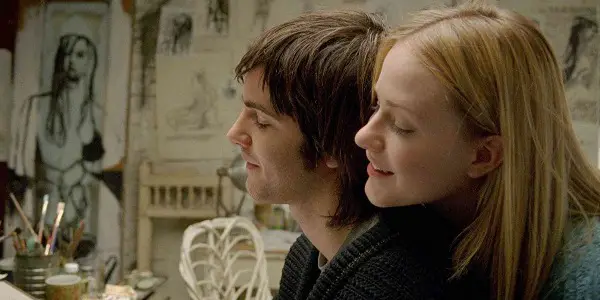
I’ve never been a big fan of musicals, and I think part of the reason is the music. It’s often that I like some but not all of the songs, so for parts of the film I’m left wanting more. So, a film consisting solely of music from The Beatles? It’s a go for me.
I know technically there are musicals out there with a better story, a tighter script, and perhaps more gusto, but Across the Universe never fails to be enjoyable. Directed by Julie Taymor, this musical has just the right amount of talent, visual flair, and musical decadence that I need. And with musicals, I’m a cheap date.
Maybe it’s the casting of Evan Rachel Wood as Lucy or Jim Sturgess as Jude. The two have genuine chemistry, and they are musically inclined. Yes, the plot is cliché and the love story not entirely fleshed out, but Across the Universe is a whimsical journey that rides on the back of some of the greatest Beatles ballads. It’s indulgent, and there are some scenes that lose me, but the songs always bring it home.
“Is there anybody going to listen to my story? All about the girl who came to stay?”
I will!
Linsey Satterthwaite – Chicago (2002)
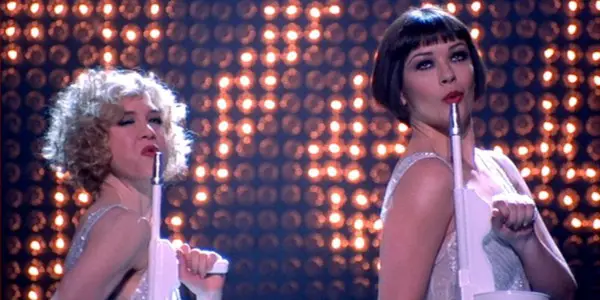
There are many forms of a musical film, but for me, its purest form is a movie that gets your toes tapping and fills your head with melodic earworms. Add to the mix a 1920s setting and sparky choreography (two things I am a sucker for), and you have the musical that makes me want to trade my cinema seat for treading the boards.
Chicago is an unashamedly old-fashioned musical; it doesn’t try to be hip or rewrite the rule book. It simply puts on its Fosse-inspired jazz shoes and zips along at a hugely entertaining pace. Renée Zellweger and Catherine Zeta-Jones light up the screen as Roxy and Velma, two warring wannabes clinging on to every column inch they can muster, with the two leads creating a feisty rivalry and throwing everything into their performances.
The rest of the cast are equally as game, with Richard Gere clearly having the time of his life as Billy Flynn, Queen Latifah relishing her turn as the incorrigible Mama Morton, and John C. Reilly in his ultimate sad sack role as Amos Hart. The film is full of dark humour, eye-catching set design, and thrilling dance numbers, a stand out being the famous Cell Block Tango, which is dripping in sexuality and deceit.
Chicago may transport viewers back to a golden age of big screen musicals, but when re-watched its satire on celebrity seems to take on a new prophecy for the social media/reality-obsessed world where hits and likes are currency and any type of fame is to be rinsed for all its worth. And so Chicago manages to be both timely and timeless, proving that it really does have the razzle dazzle and it really is all that jazz.
Nathan Osborne – La La Land (2016)
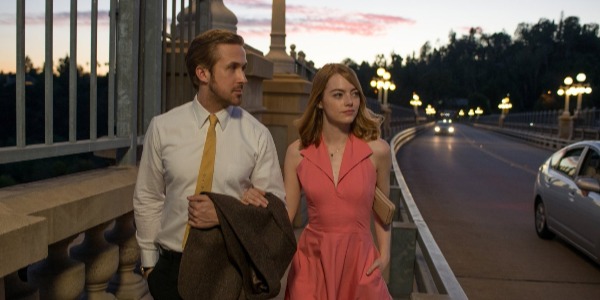
You can tell me La La Land is overhyped; you can tell me La La Land doesn’t deserve its abundance of awards and acclaim; you can even tell me that it rips off bygone musicals, but I must heartily, respectfully, and a little angrily disagree. Damien Chazelle, Emma Stone, and Ryan Gosling’s love letter to Hollywood is wistful, with its hopeful optimism continuing to be the perfect antidote for the increasingly turbulent times we are unfortunately becoming accustomed to: it is perfect cinematic escapism.
It is stunning in every frame, narratively, thematically, sonically and visually; stunning in the way Chazelle envisions the world so wonderfully with bold, confident direction and sequences; stunning in the way Stone and Gosling inject so much life, charm, and nuance into their performances and effervescent chemistry; stunning in the way Justin Hurwitz scores the entire piece so emotionally. From the joy of “Another Day of Sun” to the emotional tenderness of “Audition (The Fools Who Dream)”, every song earns its place in the setlist and help craft one of the finest soundtracks of the decade. So many talented people have dedicated their skills to this film, each pouring their craft and expertise into this slice of cinematic excellence.
La La Land is currently my favourite film of all time and looks set to continue in that position for a long time to come. It accomplishes this not only because of the phenomenal end product that impresses more and more with every viewing but for the feeling, the inspiration, and encouragement to dream it conjures and instills within me. Every time I watch this, it feels like the first time. That’s a real special magic to capture.
Thank you La La Land,and thank you Mr. Chazelle. Here’s to the fools who dream, indeed.
Amanda Mazzillo – Phantom of the Paradise (1974)
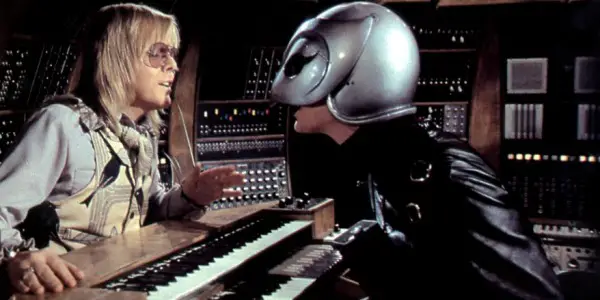
Musicals are one of my favorite genres, but it’s difficult to decide which is my favorite. I finally landed on Phantom of the Paradise, a film with an interesting story mixing Faust, The Phantom of the Opera, and The Picture of Dorian Gray.
Phantom of the Paradise does a wonderful job of creating the 1970s music scene through inspiration from classic European literature. I’m listening to the soundtrack as I type this, and I’m remembering just how much I like each and every song Paul Williams wrote for the film.
Phantom of the Paradise is my favorite Brian De Palma film, and while this seems to confuse most of the people I talk to, there’s something powerful about this film and its combination of horror, comedy, and music. De Palma utilizes many techniques which show up in his other work. One of my favorite moments in this film creatively uses split screen to show both a performance on stage as well as what is happening behind the scenes at the same time. This moment manages to add suspense while also still showcasing The Beach Bums, formerly The Juicy Fruits, performing their song in all its Beach Boys parody glory.
Phantom of the Paradise mixes so many genres and musical styles I love, so it will always be one of my favorites.
Frazer MacDonald – Searching for Sugar Man (2012)
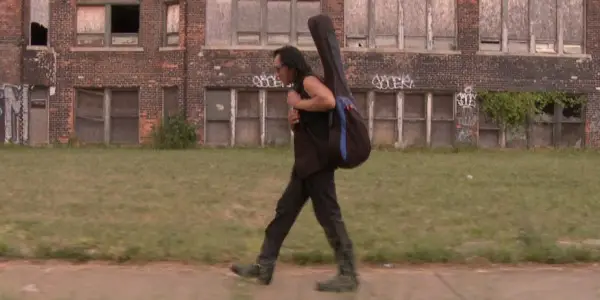
Searching for Sugar Man is a biopic that plays out like a mystery, and to tell you a whole lot more than that would ruin the viewing experience.
Here’s all you need to know before going in: there’s a musician who is famous in South Africa, but not America, and nobody knows where he is (or if he is). But aside from being a film which relies on you knowing very little about its central figure, it’s also a very stylish one, with the narrative engineered to make Searching for Sugar Man a punchy watch.
It’s only 85 minutes long. Malik Bendjelloul and his team eke every bit of intrigue out of the story with their presentation, and even if they hadn’t had the amount of skill they do, the film still would’ve been an interesting one. The whole thing culminates in a surprisingly moving ending, and although it’s common for musical biopics to have an emotional impact, very few of them have a figure as likeable or magnetic as Sixto Rodriguez in them.
Jay Ledbetter – The Umbrellas of Cherbourg (1964)
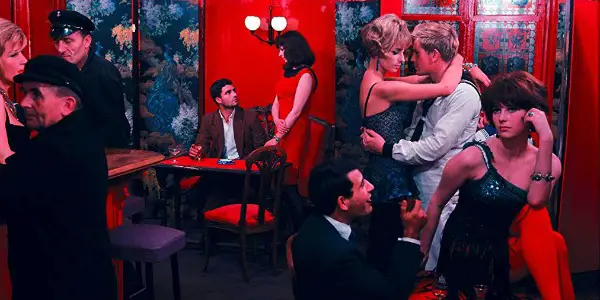
Very few movies can capture as much joy as The Umbrellas of Cherbourg. Very few movies can capture as much melancholy as The Umbrellas of Cherbourg. It is unlike any other film I have seen, and its bittersweet love story is one of the greatest ever put on film, regardless of genre. Guy (Nino Castelnuovo) and Geneviève (the truly breathtaking Catherine Deneuve) are young lovers experiencing an intensely romantic relationship for the first time. The world around them is bright and vibrant, and everyone is choreographed to capture their emotions. The early portion of the film perfectly captures love as a setting.
Unfortunately, the two are separated when Guy is called to serve in the military. In classic naive lovebird fashion, the two pledge their love and promise to be faithful while Guy is away. That night, the two of them do something a little unexpected — make a baby.
Unsurprisingly, their love pact doesn’t play out exactly as they planned and Geneviève marries a rich jeweler while Guy is still deployed. Upon his return, Guy is broken. He has lost the woman he loves and adjusting to civilian life proves difficult. Gone are the bright colors and dances. He settles on a marriage with just as much dispassion as Geneviève, and their lives split off for good. At least, that’s what they thought.
In one of the greatest final scenes I have ever had the pleasure of watching, Geneviève drives up to the gas station that Guy now owns with their daughter in the passenger seat (it was the 1950s, they didn’t really know that was unsafe back then — I think). Their conversation is tragic and cathartic. Whether they are the happiest they can be is left up in the air, but despite the love they still have (and always will have) for each other, they have been able to find ways to be happy enough.
I watched this movie because Damien Chazelle kept name-dropping it during the press run leading up to the release of La La Land. I loved that movie, so I figured I would give The Umbrellas of Cherbourg a chance. I can now safely say that Chazelle did a great job capturing so much of what Umbrellas captures, but he didn’t quite match the original recipe.
Adriana Gomez-Weston – Moulin Rouge! (2001)
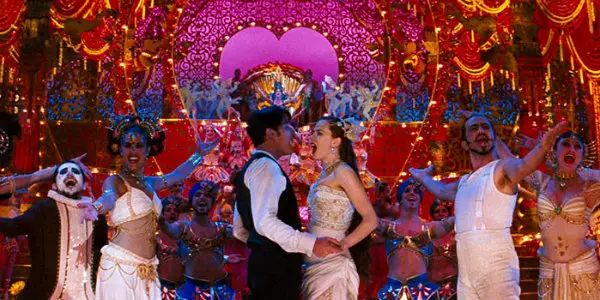
If there was any film that I regret not experiencing during its original theatrical run, it is Moulin Rouge!. One of the greatest modern musicals, it is a colorful and moving spectacle. In my mind, I couldn’t really categorize it as a film but as an experience.
Perhaps Baz Luhrmann’s best film, Moulin Rouge! is a mind-boggling mashup of modern pop and rock songs and a tribute to the tragic love stories of the past. A surreal journey through turn of the 20th century Paris, it is a story of star-crossed lovers: penniless writer Christian (Ewan McGregor) and beautiful courtesan Satine (Nicole Kidman).
At the beginning of the film, Christian decides to leave industrial London to live a simple, bohemian existence in Paris. Unlike a lot of his peers, Christian wholeheartedly believes in truth, beauty, freedom…and love. During a chance encounter, he becomes part of a group of artists looking to peddle their play to the Moulin Rouge. They decide to use Moulin Rouge’s lead courtesan as means to get the play greenlit. On the same night, Satine is scheduled for a special rendezvous with The Duke (Richard Roxburgh). The two get mixed up, and Satine mistakes Christian for the Duke. After Satine discovers that Christian is only a poor writer, she initially turns him away…but has already fallen in love with him.
Moulin Rouge! revives songs from the likes of Nirvana, Madonna, Elton John, and David Bowie and makes them its own. They stick in your mind long after the movie is over. I keep the songs on regular rotation to this day.
David Fontana – Singin’ in the Rain (1952)
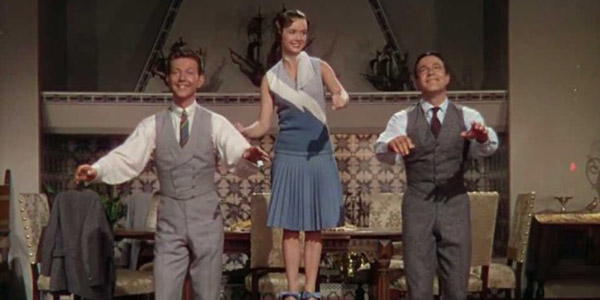
When describing movies, I often try to avoid the word “magical,” feeling that it is a somewhat overused term that tends to lose its meaning. There is one exception to this, though, and that is with Gene Kelly‘s timeless musical that he has now become synonymous with: 1952’s Singin’ in the Rain. There are many ways to describe Singin’ in the Rain, and “magical” is definitely one of them.
Premiering in 1952, but taking place in the early 1920’s, Singin’ in the Rain is a unique bit of nostalgia. It focuses on Don Lockwood (Kelly) and his sidekick Cosmo Brown (Donald O’Connor). Lockwood is already a household name due to silent films made with Lina Lamont (a delightfully obnoxious Jean Hagen), but now with the recent release of The Jazz Singer, he realizes that, in order to move forward they would have to embrace this new trend of “talkies.” The conflict, though, is that Lina Lamont’s voice is anything but glamorous. And that’s where the lovely Kathy Selden (Debbie Reynolds) comes in: with her beautiful, singsong voice, she could dub for Lina, and no one would be any the wiser. But she might be endangering her own career in the process.
Though essentially a lighthearted musical/comedy/romance (and triumphantly succeeding at all three), Singin’ in the Rain is even more than its kooky synopsis would suggest. It is at once a satire of show business, a nostalgic glance at the time when silent movies transitioned into sound, and a celebration of art itself. Gene Kelly‘s wonderfully expressive dances, which he also choreographed, are at the peak of what dancers should aspire to. And nearly every song and dance routine are now varying levels of iconic, ranging from the wacky, fun “Make Em Laugh” to the absurd “Moses, Supposes,” to a lengthy hypnotic noiresque dance sequence starring soon-to-be legend Cyd Charisse. Of course, there is also the title song itself. Try to watch Gene Kelly‘s gleeful dance routine, as he spins around with his umbrella and stomps through the rain-drenched streets, and not smile through its entirety. I dare you.
Though Gene Kelly and co-director Stanley Donen had already made numerous hits by this point, including On the Town and An American in Paris, it is far and above Singin’ in the Rain for which they are most well-known. It is a pure delight of a film, one which, regardless of mood or current state of mind, will instantly life your spirits, like a warm embrace. That’s what it has always meant to me, at any rate, and I don’t see that changing anytime soon.
Gus Edgar-Chan – 3 Idiots (2009)
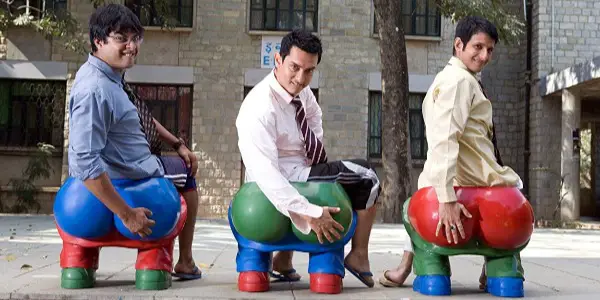
In the Western Hemisphere, at least, musicals are making a comeback. The barren run following the ’80s was never going to last, and if Sing Street didn’t quite manage it, La La Land and The Greatest Showman have popularised the genre once more (though this decade’s best English-language musical goes to the under-appreciated London Road). For Bollywood, however, musicals have always been the rave.
3 Idiots isn’t a musical in the strictest sense: in over 3-hours of swooning melodrama, it only has time for two song-and-dance extravaganzas. Luckily, they make a big impression. This is a film that attacks the fierce and stifling school system, where grades are prioritised over enjoyment and pen and paper dictates the future. It condemns overbearing parents, corrupt teachers, and the fundamental wrongness of India’s views towards education. This is heavy subject matter, and you’d be forgiven for assuming the dance numbers are some form of twisted, wailing lamentations.
But 3 Idiots slices through the oppressive premise with some infectious and wholly joyous musical set pieces that demonstrate the life these students contain – the same life that India is wasting. All Izz Well is a send-up to goofball optimism, all gurning faces, flailing arms, and slapped arses, sucker-punched by a heartbreaking ending that encapsulates the film’s dizzying mood swings. Meanwhile, Zoobi Doobi is a non-sequiturial ode to romance and its defiance of crippling outside forces, whether that be the iron fist of a suffocating father or the divide between rich and poor. They’re both insanely effective earworms, and, much like the brilliant film they take place in, are stripped of all pretension, gratifyingly evocative of a single, crucial mindset. All Izz Well indeed.
Zoe Crombie – Sweeney Todd: The Demon Barber of Fleet Street (2007)
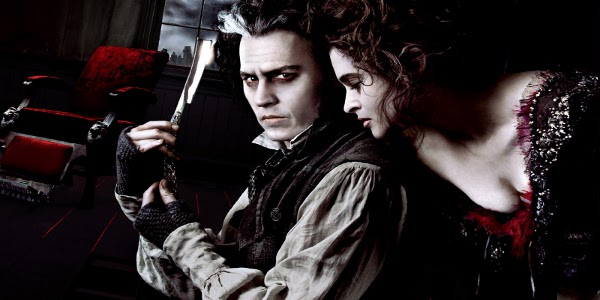
I’ll preface this by saying that I’m a bit of a Tim Burton apologist, even going so far as to enjoy Dark Shadows. One of the most visually distinctive and well-known auteurs working today, it is arguably in the melodramatic and often Gothic genre of the classic musical in which he shines. Corpse Bride, many elements of The Nightmare Before Christmas, and here in Sweeney Todd are, in my opinion, some of his best works.
The premise feels almost notorious: a vengeful barber, a pie maker struggling for meat, and a suspicious number of men going out for a high-quality shave only to never return. Bar leaving out a couple of songs – a wise choice that helps the pacing enormously – the film plays out almost identically to Sondheim’s original show, providing a level of relief for those protective of the source material.
Only Burton could bring to life such a simultaneously exquisite and disgusting rendition of London. As the titular character says, this city is a place that the ‘vermin of the world inhabit’, and the sweeping, computer-aided shots of dank alleys, unidentified black liquids oozing onto the streets, and opening credits that follow a literal bloodstream all serve to make this a visual reality. The incredibly elaborate costumes and desaturated colours make this visceral world somehow alluring, not attempting and failing at ‘realism’ in the manner of 2012’s Les Misérables but instead allowing the intense stylisation to lift the bizarre, fairy tale-like plot.
I find it hard to appreciate the older work of the now disgraced Johnny Depp, but personally I have always found the shining lights of Sweeney Todd to be Helena Bonham Carter as pie shop owner Mrs. Lovett and the late Alan Rickman as the main antagonist, Judge Turpin. Whilst the former achieves a balance between wistfulness and cruel desperation, the latter is an elegant example of a true Machiavellian villain, made believable by Rickman’s barely restrained fury and always intimidating presence. For me and many others, though, the crowning moment of this film is the stunning duet between Depp and Rickman as they sing the delicate yet sinister Pretty Women, which slowly builds to an unbearable level of tension before crashing down.
Despite some dodgy singing at points (particularly when compared to the Broadway cast), the beautiful and bombastic songs from Sondheim’s musical are electric when combined with the intense visual style. The opening song No Place Like London sets a dismal, foreboding scene that looms over the rest of the movie, and the use of montage during the Johanna reprise brings the film into the arena of true slasher horror. This also works for the lighter, more hopeful moments of Sweeney Todd; Not While I’m Around has transcended its source material through numerous covers, and for good reason.
If you appreciate or can stomach good stylised horror and yearn for a classic musical that doesn’t attempt to distance itself from the genre, then look no further than Sweeney Todd.
Darryl A. Armstrong – My Fair Lady (1964)

George Cukor’s film adaptation of My Fair Lady starred Rex Harrison, reprising his turn from the Broadway production, as Professor Henry Higgins and Audrey Hepburn as Eliza Doolittle. Higgins is a linguistics professor who makes a bet with new acquaintance Col. Hugh Pickering (Wilfrid Hyde-White) that he can transform a lower-class street girl, Doolittle, into a refined lady with an aristocratic accent.
Hepburn replaced Julie Andrews, who had starred as Doolittle in the Broadway production, much to Harrison’s chagrin–he had hoped to work with Andrews again. Hepburn herself walked off the set when she learned her songs would be dubbed by Marni Nixon (who played Sister Sophia in another famous musical, The Sound of Music).
The story, based on George Bernard Shaw’s Pygmalion – itself a retelling of Ovid’s tale of the sculptor who fell in love with one of the statues he carved – begins with that troubling wager. The idea of the powerful making bets over the lives of the working class is nothing new. Indeed, one can find similar stories everywhere from Job in the Bible to other tales in Greek mythology, and despite the nod toward teaching professor Higgins a lesson, it doesn’t have the courage to actually make him learn it.
Still, with all its questionable treatment of both its leads and production issues, My Fair Lady remains a charming film. Hepburn shines at every step along her journey, from feisty street-walker to aristocratic mountebank. It’s hard not to be swept away in movie musical reverie during “I Could Have Danced All Night” or engagingly wrestle through “The Rain in Spain,” which is at turns venomous, at turns triumphant.
Those are some of our favorite movie musicals. What are yours? Let us know in the comments!
Does content like this matter to you?
Become a Member and support film journalism. Unlock access to all of Film Inquiry`s great articles. Join a community of like-minded readers who are passionate about cinema - get access to our private members Network, give back to independent filmmakers, and more.
Alex is a film addict, TV aficionado, and book lover. He's perfecting his cat dad energy.


